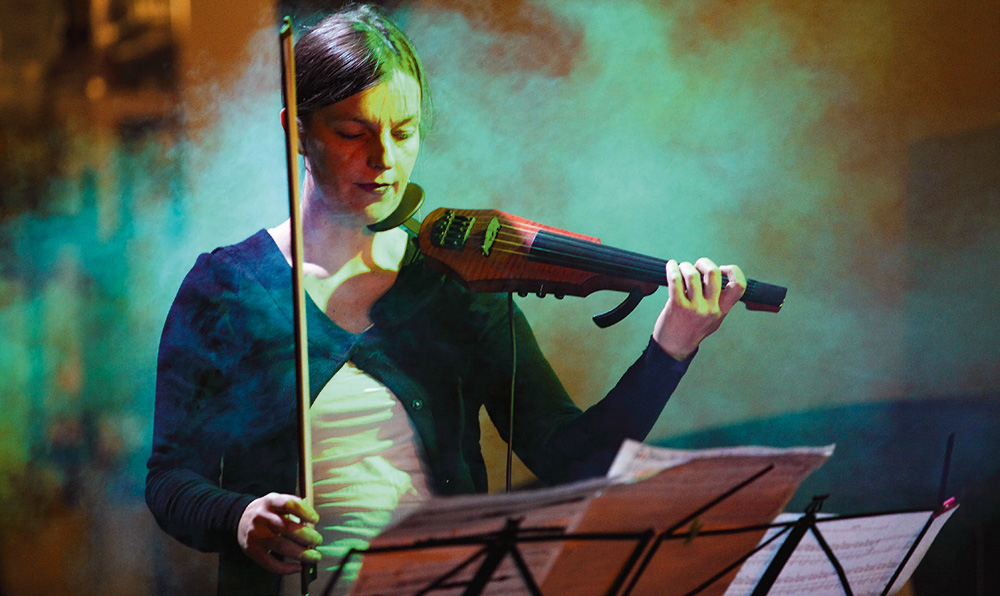Wie sind Sie über Ihre eigene künstlerische Praxis zur künstlerischen Forschung gelangt?
Barbara Lüneburg (BL): Ich habe das erste Mal im Rahmen meiner Dissertation an der Brunel University London künstlerisch geforscht. Mein Thema war damals das kreative Potenzial von Performer_innen in der zeitgenössischen Musik und zwar von dem Moment an, an dem wir neue Werke beauftragen bis zu dem Augenblick auf der Bühne, wenn wir diese Werke dem Publikum präsentieren. Felder, die ich dabei intensiv beforscht habe, waren die „Kollaboration“ zwischen Performer_innen und Komponist_innen sowie das Verhältnis zwischen Interpret_in und Publikum. Damit zusammenhängend habe ich mich mit Fragen zum Wesen von und zur Entwicklung von „Charisma“ und „Konzertaura“ beschäftigt.

Welche Verfahren und Methoden können Sie für diesen Prozess des Ineinandergreifens von Kunst und Forschung beschreiben?
BL: Wichtig ist bei künstlerischer Forschung, dass Forschung von innen heraus geschieht. Künstler_innen erforschen dabei systematisch und methodologisch reflektiert ihre eigene Praxis, den Prozess des Kunstschaffens und auch das Kunstwerk an sich. Forschungsphilosophischer Hintergrund und methodologischer Ansatz müssen dabei für jedes künstlerische Forschungsprojekt sorgfältig und maßgeschneidert gewählt werden. In meiner eigenen Forschung ist neben dem eigentlichen Prozess des Kunstschaffens immer ein interdisziplinärer Ansatz wichtig gewesen. Ich beobachte ein interdisziplinäres Forschen auch bei vielen anderen künstlerischen Forschungsprojekten und halte es für sehr sinnvoll. Das Nutzen erprobter Methodologien aus anderen Disziplinen und das Arbeiten über Grenzen hinweg erweitert unsere Perspektiven auf das eigene Schaffen und die Prozesse, in denen wir uns befinden, und hilft dabei, unsere Forschung kritisch zu reflektieren und zu hinterfragen. Grundlegend aber ist für die künstlerische Forschung, dass sie die eigene Kunstpraxis als zentralen Fokus nutzt. Forschungsfragen entstehen aus der Kunst und führen wieder dahin zurück. Sie ist Forschung für Kunst, durch Kunst und mit den Mitteln der Kunst.
Welche Förderinstrumente haben Ihnen auf diesem Weg geholfen?
BL: Ein fantastisches Fördermittel ist PEEK, das Programm zur Entwicklung und Erschließung der Künste des Österreichischen Wissenschaftsfonds FWF. Ich habe über vier Jahre das künstlerische Forschungsprojekt TransCoding – From ‘Highbrow Art’ to Participatory Culture als PEEK-Projekt geleitet. Hier haben mein Team und ich eine Community aufgebaut, die über Social Media durch ihre Beiträge an der Schaffung mehrerer Kunstwerke aktiv teilgenommen hat. Die Frage war dabei nicht nur, wie man ein Publikum, das ursprünglich nicht von der zeitgenössischen Musik oder Kunst kommt, hierfür interessieren und darin involvieren kann, sondern auch, was die Durchlässigkeit gegenüber der Community und die Zuerkennung von Autorität für unsere teilnehmenden Mitglieder mit der Kunst, den Künstler_innen und natürlich den Community-Mitgliedern macht.
Welche Schwerpunkte werden Sie im Rahmen Ihrer neuen Professur für künstlerische Forschung an der Anton Bruckner Privatuniversität Linz setzen?
BL: Ein Schwerpunkt meiner eigenen Forschung im Rahmen der Professur wird sicher die Forschung zum Feld der Performance an sich bleiben. Ich habe hier auch schon Ideen für ein neues PEEK-Projekt. Darüber hinaus würde ich mir wünschen, dass es mir gemeinsam mit meinen Kolleg_innen an der Anton Bruckner Privatuniversität in Linz gelingt, mit den und um die neuen wissenschaftlichen und künstlerisch-wissenschaftlichen Doktoratsschulen ein lebhaftes Forschungsumfeld zur Entwicklung und Erschließung der Künste aufzubauen, das weite Ausstrahlung hat. Ich bin gespannt auf unsere internen, nationalen und internationalen Kooperationen, und ich freue mich besonders darauf, dass die mdw eine unserer Kooperationspartner_innen sein wird.
Wie sehen Sie die Entwicklungen im Bereich des künstlerischen Doktorats im internationalen Kontext? Welche Inhalte und Methoden sind aus Ihrer Sicht für das künstlerische Doktorat bestimmend?
BL: Es gibt sehr unterschiedliche Ansätze zur künstlerischen Forschung. Die einen sind an dem Erkenntnisgewinn durch Kunst, also durch das Kunstwerk an sich, besonders interessiert, andere wollen über die Erforschung ihrer eigenen Praxis Wissen für ihre eigene Disziplin schaffen, und wieder andere wollen ein neues künstlerisches Feld systematisch entwickeln und erschließen und tun dies mit Mitteln der künstlerischen Forschung. Die Inhalte und Themen für künstlerische Doktorate sind dabei so vielseitig wie die Kunst selbst.

